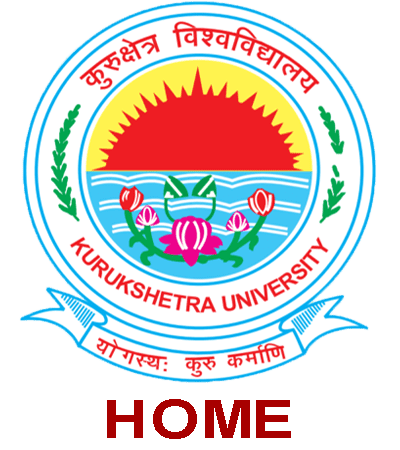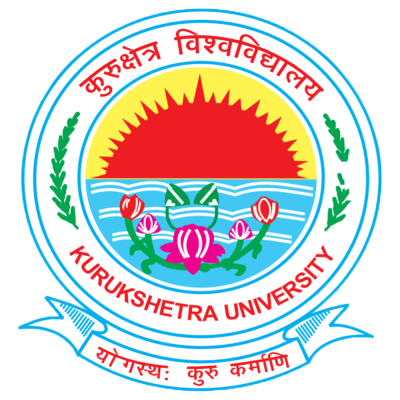Department of Instrumentation
Kurukshetra University, Kurukshetra
Main Menu
Programs
Undergraduate Programs
* B. Tech (Electrical Engineering) - 4 year’s
Postgraduate Programs
* M. Tech (Electrical and Instrumentation Engineering) - 2 year’s
Curriculum
Doctoral Programme
* Ph. D Programme in Instrumentation
Programme Educational Objectives (PEOs):
The Department of Instrumentation in consultation with various stakeholders have formulated the Programme Educational Objectives (PEO’s) that are broad statements that describe the career and professional accomplishments that the program is preparing its graduates to achieve in few years, subsequent to receiving the degree. The PEO’s of the B. Tech. programme in Electrical and Instrumentation Engineering are as follows:
-
PEO1: The graduates will become competent by applying their technical and managerial skills.
-
PEO2: The graduates will be able to adapt to any environment and succeed in higher positions in contemporary rapidly evolving technologies in Electrical and Instrumentation engineering field.
-
PEO3: The graduates will engage themselves in the life-long learning by pursuing higher education and participation in research and development activitiesto meet all challengesto transform them as responsible citizens of the nation
Program Specific Outcomes (PSO’s):
-
PSO1: Clearly understand the fundamental concepts of Electrical and Instrumentation Engineering
-
PSO2: Graduates will be able to formulate and solve real life problems in the area of Electrical and Instrumentation Engineering
-
PSO3: Graduate will possess the skills to communicate effectively in both oral and written forms, demonstrating the practice of professional ethics, and responsive to societal and environmental needs.
Program Outcomes (PO) with Graduate Attributes
Programme Outcomes are attributes of the graduates from the programme that are indicative of the graduates’ ability and competence to work as an engineering professional upon graduation. Program Outcomes are statements that describe what students are expected to know or do by the time of graduation, they must relate to knowledge and skills that the students acquire from the programme. The achievement of all outcomes indicates that the student is well prepared to achieve the program educational objectives down the road. The Department of Instrumentation engineering has following twelve PO’s. The course syllabi and the overall curriculum are designed to achieve these outcomes:
S. No |
Graduate Attributes |
Program Outcomes (POs) |
1 |
Engineering Knowledge |
PO1: Able to understand the fundamentals of mathematics, science, Electrical and Instrumentation Engineering and apply them to provide solution of complex engineering problems. |
2 |
Problem Analysis |
PO2: Ability to analyze, identify, formulate and solve engineering problems in Electrical and Instrumentation Engineering using basic fundamental principles of mathematics and science. |
3 |
Design and Development of Solutions |
PO3: Design a system, component or process to meet the desired needs and standards within realistic constraints such as public health and safety, social and environmental considerations. |
4 |
Investigation of Problem |
PO4: Design and conduct experiments, as well as do research, analyze and interpret data and give clear solutions. |
5 |
Modern Tool usage |
PO5: Use and learn the recent techniques, skills and modern engineering and IT tools necessary for engineering practicewith an understanding of the limitations. |
6 |
Engineer and society |
PO6: To give basic knowledge of social, economic, safety and cultural issues relevant to professional engineering. |
7 |
Environment and sustainability |
PO7: To impart knowledge related to the design and development of modern systems which are environmentally sensitive and to understand the importance of sustainable development. |
8 |
Ethics |
PO8: Apply ethical principles and professional responsibilities in engineering practice. |
9 |
Individual & team work |
PO9: Ability to visualize and function as an individual and as a member in a team of a multi-disciplinary environment. |
10 |
Communication |
PO10: Ability to communicate effectively on complex engineering ideas to the engineering community & the society at large. (i.e. being able to comprehend and write effective reports and design documentation, make effective presentations, and give and receive clear instructions) |
11 |
Lifelong learning |
PO11: To impart education to learn and to engage in independent and life – long learning in the technological change. |
12 |
Project management and finance |
PO12: Ability to handle administrative responsibilities, manage projects & handle finance related issues in a multidisciplinary environment. |
Program Outcomes (PO) with Post Graduate Attributes
Programme Outcomes are attributes of the Post Graduate from the programme that are indicative of the Post Graduate’ ability and competence to work as an engineering professional upon graduation. Program Outcomes are statements that describe what students are expected to know or do by the time of graduation, they must relate to knowledge and skills that the students acquire from the programme. The achievement of all outcomes indicates that the student is well prepared to achieve the program educational objectives down the road. The Department of Instrumentation engineering has following twelve PO’s. The course syllabi and the overall curriculum are designed to achieve these outcomes:
S. No. |
Post Graduate Attributes |
Program Outcomes (POs) |
1 |
Knowledge |
PO1: Capable of demonstrating comprehensive disciplinary knowledge gained during course of study |
2 |
Research Aptitude |
PO2: Capability to ask relevant/appropriate questions for identifying, formulating and analyzing the research problems and to draw conclusion from the analysis |
3 |
Communication |
PO3: Ability to communicate effectively on general and Technical topics with the engineering community and with society at large |
4 |
Problem Solving |
PO4: Capability of applying knowledge to solve Engineering and other problems |
5 |
Individual and Team Work |
PO5: Capable to learn and work effectively as an individual, and as a member or leader in diverse teams, in multidisciplinary settings. |
6 |
Investigation of Problems |
PO6: Ability of critical thinking, analytical reasoning and research based knowledge including design of experiments, analysis and interpretation of data to provide conclusions |
7 |
Modern Tool usage |
PO7: Ability to use and learn techniques, skills and modern tools for scientific and engineering practices |
8 |
Engineering and Society |
PO8: Ability to apply reasoning to assess the different issues related to society and the consequent responsibilities relevant to the professional Engineering practices |
9 |
Life-Long Learning |
PO9: Aptitude to apply knowledge and skills that are necessary for participating in learning activities throughout life |
10 |
Ethics |
PO10: Capability to identify and apply ethical issues related to one’s work, avoid unethical behaviour such as fabrication of data, committing plagiarism and unbiased truthful actions in all aspects of work |
11 |
Project Management |
PO11: Ability to demonstrate knowledge and understanding of the engineering principles and apply these to manage projects |
Haryana
Copyright © 2020 Kurukshetra University, Kurukshetra. All Rights
Reserved.
Powered by: Dexpert Systems
Pvt Ltd

